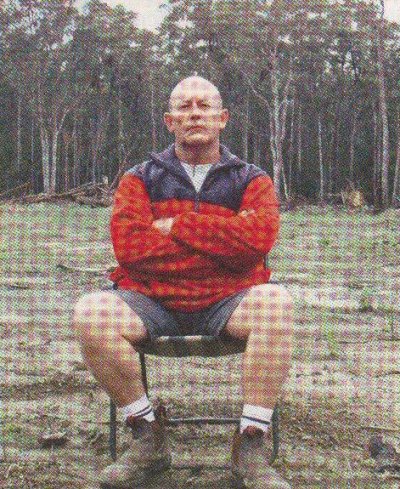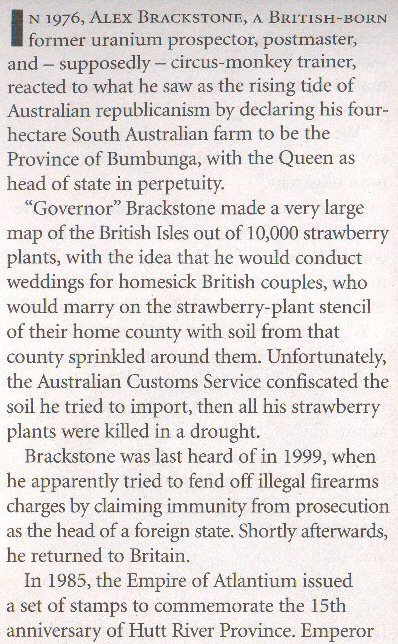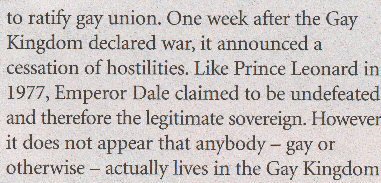Danielle
Heir Presumptive
- Joined
- May 23, 2004
- Messages
- 2,954
- City
- Sydney
- Country
- Australia
Ever since I saw this documentary on TV, I have become interested in micronations. I was going to post something about that documentary yesterday, but to my surprise, I found a very good article* in this morning’s newspaper. I have scanned the article, but it hasn’t come out very well and the files were so big, that I had to break them up into smaller articles. It also may be confusing to read and it’s mainly about Australian micronations, but I hope someone finds it interesting. Warning: there are a few swear words in the article.
* Good Weekend - The Sydney Morning Herald Magazine
A definition a micronation (from Wikipedia.org):
Micronations - which are sometimes also referred to as cybernations, fantasy countries, model countries, new country projects, and online nations - are entities that resemble independent states, but for the most part exist only on paper, on the Internet, or in the minds of their creators; a small number have also managed to extend some of their operations into the real world. When they do touch on the real world, they converge to some degree with other organizing paradigms that offer, or seem to offer, political or infrastructural independence of some sort.
The term micronation, which literally means "small nation", is a neologism originating in the 1990s to describe the many thousands of small unrecognized statelike entities that have mostly arisen since that time. The term has since also come to be used retrospectively to refer to earlier unrecognized entities, some of which date to as far back as the 19th century. Supporters of micronations use the term "Macronation" for any "real" sovereign nation-state.
Micronations generally have a number of common features:
* Good Weekend - The Sydney Morning Herald Magazine
A definition a micronation (from Wikipedia.org):
Micronations - which are sometimes also referred to as cybernations, fantasy countries, model countries, new country projects, and online nations - are entities that resemble independent states, but for the most part exist only on paper, on the Internet, or in the minds of their creators; a small number have also managed to extend some of their operations into the real world. When they do touch on the real world, they converge to some degree with other organizing paradigms that offer, or seem to offer, political or infrastructural independence of some sort.
The term micronation, which literally means "small nation", is a neologism originating in the 1990s to describe the many thousands of small unrecognized statelike entities that have mostly arisen since that time. The term has since also come to be used retrospectively to refer to earlier unrecognized entities, some of which date to as far back as the 19th century. Supporters of micronations use the term "Macronation" for any "real" sovereign nation-state.
Micronations generally have a number of common features:
- Many micronations assert that they wish to be widely recognised as sovereign states - but they are not so recognised by established states.
- Micronations are quite small, both geographically and in terms of membership. They rarely have more than a few thousand members - and the vast majority have no more than one or two active participants.
- Micronations typically issue formal instruments such as passports, stamps and currency, and confer titles and awards - but these are rarely recognised as having any form of validity outside their own communities of interest.
Attachments
-
 Micro2b.jpg112.1 KB · Views: 355
Micro2b.jpg112.1 KB · Views: 355 -
 Micro2c.jpg120.2 KB · Views: 424
Micro2c.jpg120.2 KB · Views: 424 -
 Micro3a.jpg76.1 KB · Views: 336
Micro3a.jpg76.1 KB · Views: 336 -
 Micro3b.jpg166.6 KB · Views: 340
Micro3b.jpg166.6 KB · Views: 340 -
 Micro4a.jpg148 KB · Views: 250
Micro4a.jpg148 KB · Views: 250 -
 Micro4b.jpg109.2 KB · Views: 354
Micro4b.jpg109.2 KB · Views: 354 -
 Micro4c1.jpg98.4 KB · Views: 307
Micro4c1.jpg98.4 KB · Views: 307 -
 Micro4c2.jpg128.7 KB · Views: 281
Micro4c2.jpg128.7 KB · Views: 281 -
 Micro2a.jpg158.4 KB · Views: 319
Micro2a.jpg158.4 KB · Views: 319 -
 Micro1.jpg159.3 KB · Views: 375
Micro1.jpg159.3 KB · Views: 375















